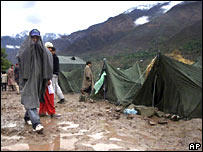Row mars S Asia quake aid effort - BBC

Helicopter crews are making hazardous trips into the mountains
http://news.bbc.co.uk/2/hi/south_asia/4351624.stm
Last Updated: Monday, 17 October 2005, 23:25 GMT 00:25 UK
E-mail this to a friend
Printable version
Row mars S Asia quake aid effort
Pakistan and India have failed to agree terms under which Indian army aircraft would join the search-and-rescue mission to reach earthquake survivors.
Pakistan says it will accept Indian helicopters but not crew, while India insists its pilots must fly the craft.
The dispute came as a top UN official said there were not enough warm tents in the world to protect refugees from the coming winter.
As many as 54,000 people may have died in the quake, local officials now say.
Many of the survivors are in remote mountains or deep valleys, and helicopter is the only way to reach them.
Map of earthquake zone
The BBC's Aamer Ahmed Khan in Karachi says an agreement between the historic rivals could potentially double the size of the fleet of relief helicopters operating in Pakistan and Pakistan-administered Kashmir.
Good weather has allowed helicopter relief efforts to resume, but 20% of the areas worst-hit may still not have been reached.
Ten days after the earthquake hit Kashmir and parts of Pakistan, India and Afghanistan, at least two million people are still homeless and at the mercy of the weather, aid officials warn.
India has suggested it will allow Pakistani aircraft to carry out relief operations on its side of the Line of Control in Kashmir, and offered to work on the Pakistani side.
Death toll grows
Deaths in Pakistani-run Kashmir alone may exceed 40,000, local officials say.
Sikander Hayat Khan, the regional prime minister, said he believed that up to 70,000 had also been injured.
If confirmed, the new death figures would bring the total to 54,000 in all areas affected by the quake.

Only the heaviest tents will protect against the brutal Kashmiri winter
Pakistan's government puts the overall number of deaths in Pakistan-administered Kashmir and North West Frontier Province at about 40,000.
In Indian-administered Kashmir, officials say 1,400 people were killed.
Aid workers say more are bound to die unless either they reach shelter, or shelter reaches them.
Andrew Macleod, operations manager of the UN Emergency Response Team working out of Islamabad, the Pakistani capital, said winter-weight tents were needed to protect people from the "cold and brutal winter" to come.
But he warned: "The need here is greater than the existence of tents in the world. We need more tents than exist."
He told the BBC's Newshour radio programme the problem was "outside the scope of any government to handle".
Mr Macleod said while many refugees were converging on centres like Islamabad and Rawalpindi, many others could not make such a journey, over several mountain ranges, when roads had been blocked or swept away in landslides.
"Here we've got over 15,000 villages spread out through the affected region."
"The affected areas are much larger in geographical size than the tsunami, and rather than being in flat coastal areas, we are operating in some of the highest mountains and deepest valleys in the world."
* Many roads in the affected area are damaged and/or impassable
Return to the top

0 Comments:
Post a Comment
<< Home